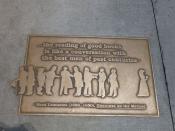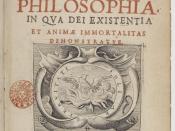In Descartes' Meditations on the First Philosophy, his "First Meditation" focuses on phenomenon that can be called into doubt. In this section, Descartes proceeds to discuss reality and illusion, and the questions these thoughts raise.
In the paragraph that begins with the line: "a brilliant piece of reasoning!," Descartes analyzes or draws connections between humans who are sane and insane, and sleep and dreams versus wakefulness and reality. In this paragraph, Descartes posits that a person whom, in insanity, has visions and hallucinations can be comparable to a person whom, in dreams, has similar visions and experiences. Furthermore, Descartes continues to note that the occurrences a person has in wakefulness perhaps can not be distinguished from the occurrences a person has in dreams. He states that (while awake): "I stretch out and feel my hand I do so deliberately, and I know what I am doing. All of this would not happen with such distinctness to someone asleep".
Here, he is speaking about the human perception of our reality, that these events are actually occurring, and thus, real. In reply to this thought, however, he soon scoffs: "Indeed! As if I did not remember other occasions when I have been tricked by exactly similar thoughts while asleep!". With these lines, Descartes addresses our equally human perception of the reality that while we dream, we believe this actions are occurring, and it is typically only later, when awake, that we realize they were not. Descartes ends this paragraph with the conclusion that "there are never any sure signs by means of which being awake can be distinguished from being asleep". This seems to suggest, as humans can not distinguish sleep and dreams from wakefulness, that what can be called into doubt are all of our experiences at the time...


